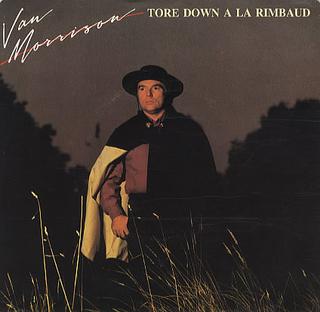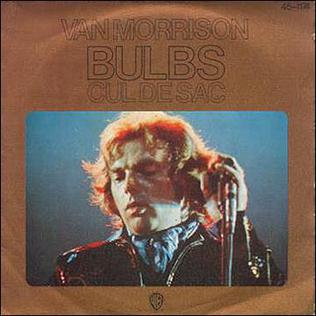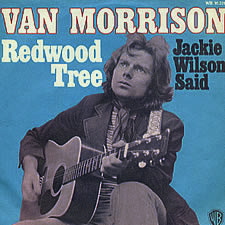
Veedon Fleece is the eighth studio album by Northern Irish singer-songwriter Van Morrison, released on 5 October 1974. Morrison recorded the album shortly after his divorce from wife Janet (Planet) Rigsbee. With his broken marriage in the past, Morrison visited Ireland on holiday for new inspiration, arriving on 20 October 1973. While there he wrote, in less than three weeks, the songs included on the album.

His Band and the Street Choir is the fourth studio album by Northern Irish singer-songwriter Van Morrison. It was released on 15 November 1970 by Warner Bros. Records. Originally titled Virgo's Fool, Street Choir was renamed by Warner Bros. without Morrison's consent. Recording began in early 1970 with a demo session in a small church in Woodstock, New York. Morrison booked the A&R Studios on 46th Street in New York City in the second quarter of 1970 to produce two sessions of songs that were released on His Band and the Street Choir.

Inarticulate Speech of the Heart is the fourteenth studio album by Northern Irish singer-songwriter Van Morrison, released in 1983. Morrison said he arrived at the title from a Shavian saying: "that idea of communicating with as little articulation as possible, at the same time being emotionally articulate". As his last album for Warner Bros. Records, he decided to do an album which had more than the usual complement of instrumental tracks. As he explained in 1984, "Sometimes when I'm playing something, I'm just sort of humming along with it, and that's got a different vibration than an actual song. So the instrumentals just come from trying to get that form of expression, which is not the same as writing a song." Although not expanded upon, of note is that a special thanks is given to L. Ron Hubbard in the liner notes. The reissued and remastered version of the album contains alternative takes of "Cry for Home" and "Inarticulate Speech of the Heart No. 2".
The Caledonia Soul Orchestra was the band created by Northern Irish singer-songwriter Van Morrison in 1973. The band was named after an eighteen-minute instrumental outtake on the His Band and the Street Choir album.

"Moondance" is a song recorded by Northern Irish singer and songwriter Van Morrison and is the title song on his third studio album Moondance (1970). It was written by Morrison, and produced by Morrison and Lewis Merenstein.

"Domino" is a hit song written by Northern Irish singer-songwriter Van Morrison. It is the opening track of his fourth studio album, His Band and the Street Choir. This song is Morrison's personal musical tribute to New Orleans R&B singer and pianist Fats Domino.
"Saint Dominic's Preview" is the title song of the sixth album by Northern Irish singer-songwriter Van Morrison, released in July 1972 by Warner Bros. It was recorded at the Wally Heider Studios in San Francisco in April 1972, with overdubs made later on. Morrison wrote it in a stream of consciousness in the same vein as some of his earlier works, particularly those on Astral Weeks. The song's narrative moves from France to San Francisco, Morrison's place of residence at the time, to Belfast, where he grew up, to New York City.
"Glad Tidings" is the tenth and final song on Northern Irish singer-songwriter Van Morrison's 1970 album Moondance.

Live at the Grand Opera House Belfast is a live album by Northern Irish singer-songwriter Van Morrison, released in 1984. It was recorded from four live shows in March 1983 at the Grand Opera House, Belfast, Northern Ireland. The album was composed of songs from Morrison's last four recordings. It is the second live album Morrison released, following 10 years after It's Too Late to Stop Now.

"Tore Down a la Rimbaud" is a song written by Northern Irish singer-songwriter Van Morrison and included on his 1985 album, A Sense of Wonder.
"Moonshine Whiskey" is a song written by singer-songwriter Van Morrison and is the concluding track of his 1971 album Tupelo Honey.

"Bulbs" is a song written by Northern Irish singer-songwriter Van Morrison. It was the only single to be taken from his 1974 album Veedon Fleece, with a B-side of "Cul de Sac" for the US release and "Who Was That Masked Man" for the UK release.
"You Don't Pull No Punches, but You Don't Push the River" is a nine-minute song by Northern Irish singer-songwriter Van Morrison. It appears on the album Veedon Fleece, released in 1974.

"Come Running" is a song written by singer-songwriter Van Morrison and included on his 1970 album Moondance.

"Blue Money" is a song written by Northern Irish singer-songwriter Van Morrison. It was the second of two Top Forty hits from his 1970 album, His Band and the Street Choir, reaching No. 23 on the US chart. The US single featured "Sweet Thing", from the album Astral Weeks, as the B-side. It was released as a single in the UK in June 1971 with a different B-side, "Call Me Up in Dreamland". The song became Morrison's third best selling single of the 1970s, remaining on the charts for three months.
"I've Been Working" is a song written by Northern Irish singer-songwriter Van Morrison appearing on the album His Band and the Street Choir, released in 1970. The song was first an outtake from Morrison's well received album Astral Weeks of 1968. Other versions of "I've Been Working" were recorded for Morrison's next album Moondance, of which, three were released on the 2013 deluxe edition.
"These Dreams of You" is a song written by the Northern Irish singer-songwriter Van Morrison on his 1970 album Moondance. It was also included on his 1974 live album, It's Too Late to Stop Now.

"Redwood Tree" is the sixth song on Northern Irish singer-songwriter Van Morrison's 1972 album, Saint Dominic's Preview, released in July 1972 by Warner Bros. It was later released in October as the second of three singles from the album and charted at number 98 on the US Billboard Hot 100.

"Ivory Tower" is a song written by Northern Irish singer-songwriter Van Morrison and included on his 1986 album, No Guru, No Method, No Teacher. The song was also released as a single with the B-side "A New Kind of Man", from his previous album A Sense of Wonder. It charted at No. 21 on the US Mainstream Rock Tracks in 1986.
"Burning Ground" is a song written by Northern Irish singer-songwriter Van Morrison and included on his 1997 album, The Healing Game. For this song, Morrison got his inspiration from a common scene from his childhood when jute was shipped to Belfast from India in the 1950s.












